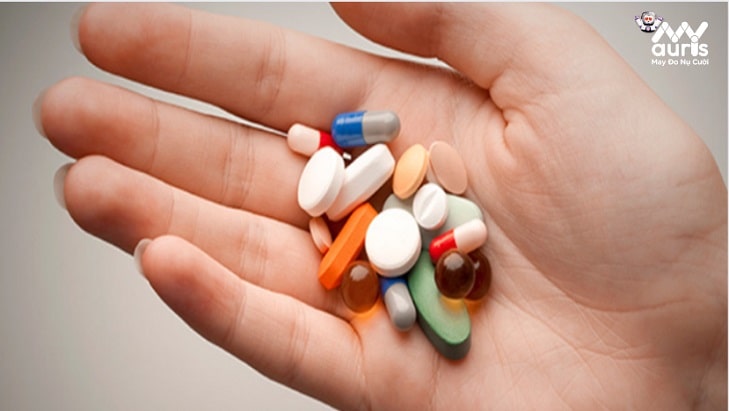Indigestion, also known as dyspepsia, is one of the common symptoms of many diseases and has a complex mechanism. However, the symptoms experienced in this case are not the same for each person. To improve this condition, patients need to change their lifestyle and take medication. So what should you do if you have indigestion? Let’s find out in detail through the article below!
Causes of indigestion symptoms
Symptoms Indigestion is pain and discomfort in the abdomen, often occurring after eating, due to problems with the digestive process in the stomach. In some serious cases, this condition can be a warning sign of an underlying digestive disease and requires timely treatment.
Moreover, indigestion symptoms often appear within a few minutes to a few hours after eating. In fact, the stomach needs about 3 – 5 hours to completely digest the food consumed, then it moves to the intestines. Meanwhile, the pancreas and gallbladder send fluids and enzymes to the stomach to support this activity. This is where indigestion symptoms often occur.

According to surveys evaluating indigestion, about 20-25% of patients with indigestion have practical causes. Meanwhile, 75 – 80% of patients suffer from functional dyspepsia. Specifically, the causes of indigestion are: duodenal ulcers, gastroesophageal reflux disease (GERD); gastritis caused by Helicobacter pylori (H.pylori – HP); pain due to bile;….
And some other causes that can lead to indigestion include:
- Eating too much or too fast: This is one of the bad habits that increases pressure on the stomach, making it easier for acid to escape.
- Excessive fat intake: High fat content stimulates the production of acids and enzymes, and irritates tissues in the digestive tract;
- Food intolerance: Symptoms of indigestion can occur when eating certain foods that the body has difficulty tolerating;
- Smoking and drinking alcohol: Harmful substances in cigarettes and alcohol will irritate the lining of the digestive tract, leading to inflammation.
- Prolonged stress and anxiety: The gastrointestinal tract is linked to bileattached to the brain through the nerves, so psychological stress and anxiety also lead to indigestion.
Methods for diagnosing indigestion
When symptoms of indigestion appear, the first thing the patient needs to focus on is improving and stabilizing the function of the digestive system with nutritious foods. This case is often applied to mild cases and the patient does not have serious symptoms.
On the contrary, if symptoms last more than 3 days and show no signs of improvement, the patient needs to see a doctor for examination and find appropriate treatment. Furthermore, depending on the patient’s condition, the doctor will prescribe a treatment regimen based on the disease.

Patients 60 years of age or older
At this time, the doctor will prescribe a gastroscopy to evaluate the indigestion condition, during the process. Endoscopy can do a quick Urease test to find H.pylori bacteria. H.pylori (HP) is a gram-negative flagellated spirochete, found in and beneath the mucosa of the gastric epidermis and can exist in the acidic environment of the stomach. In case the patient is infected with H.pylori, treatment to kill this bacteria is often prescribed. On the contrary, if the results of gastroscopy and other tests are normal, it can be concluded that functional indigestion is caused.
For patients under 60 years old
Patients with indigestion need to find and destroy H.pylori. In case a patient has indigestion but is H.pylori negative or still has many indigestion symptoms after H.pylori has been eliminated, they will be treated with PPI (proton pump inhibitor). After about 8 weeks of PPI treatment, if the condition does not improve, there will be another treatment regimen suitable for the current condition. Furthermore, at this age, gastroscopy will be indicated when there is one of the following signs:
- Significant and unusual weight loss
- Difficulty swallowing, painful swallowing or prolonged vomiting;
- Feeling when a mass or lymph node is felt
- Anemia of unknown cause;
- ….
Indigestionwhat to do? Effective prevention method
Using medication for treatment
- Over-the-counter (OTC) antacids: Antacids neutralize stomach acid and avoid irritating tissues. However, patients should not use it regularly.
- H2 blockers: This group of drugs works to reduce acidity by inhibiting the body’s production of histamine. In addition, over-the-counter antacids can be used more frequently, but the effects do not last long;
- Proton pump inhibitors (PPIs): Proton pump inhibitors have the ability to block the production of stronger acids while effectively promoting tissue healing. This medication is often prescribed when indigestion symptoms are relatively severe, and there are signs of tissue damage or ulcers in the digestive tract.

Change to a healthier lifestyle
Healthy living habits will help protect the body comprehensively, including the digestive system. You should exercise daily to increase your resistance and combine it with a moderate diet. In addition, you need to develop a reasonable sleep regimen that will help you have good health and minimize disease.
However, to maintain a good digestive system, as well as treat mild indigestion, you can change your eating habits to benefit digestion, while increasing the ability to absorb nutrients. Includes:
- Spread your meals small, don’t overeat;
- Limit eating canned or processed foods;
- Do not use too much carbonated soft drinks;
- Limit smoking and excessive alcohol abuse;
- Avoid vigorous exercise after eating a full meal.
Scientific nutrition regimen
A nutritional regimen is one that fully participates in macronutrient groups including starch and fat. and protein. Besides, in addition to adding micronutrients such as vitamins and minerals to each meal, it also helps improve nutrients and strengthen digestion.
However, fiber is also an important substance in improving and stabilizing digestion, especially preventing indigestion. In addition, fiber has the ability to regulate intestinal bacteria, optimally protecting the digestive system.
What to do if you have indigestion? This is not a serious medical condition, patients can treat it at home by drinking lots of water, or taking medication to support digestion. It is a common symptom of most digestive disorders with bloating, flatulence, and accompanied by pain and tightness in the abdominal area. However, My Auris encourages patients to have regular health check-ups to prevent diseases more effectively.
Kim Dung





